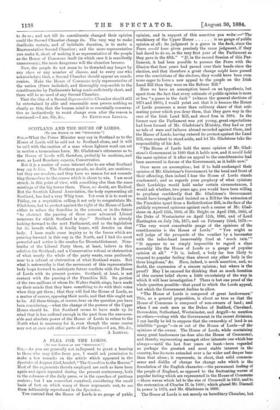SCOTLAND AND THE HOUSE OF LORDS.
[To rag EDITOR OF THE " SPECTATOR."] SIR,—What the Prime Minister may say in Scotland as to the House of Lords will be said not to Scotland alone, and it will be said with the caution of a man whose lightest word can set in motion a tremendous force. Mr. Gladstone's utterances as to the House of Lords will, therefore, probably be cautions, and even, as Lord Rosebery expects, Conservative.
But it is a matter of some interest also to see what Scotland may say to him. The Northern people, no doubt, are cautious ; but they are resolute, and they have no reason for not commit. ting themselves to the course which is about to win. I am most struck, in this point of view, with something else than the mass meetings of the big towns there. These, no doubt, are Radical. But the Scottish Liberal Association, the body representing all Scotland, has had a very Whig tone. Yet even it is to meet on Friday, on a requisition calling it not only to congratulate Mr. Gladstone, but to protest against the right of the House of Lords either to refuse the franchise in the present, or in the future " to obstruct the passing of those more advanced Liberal measures for which Scotland is ripe." Scotland is already looking forward to the next Parliament, and to the legislation for its benefit which, it fondly hopes, will devolve on that body. I have made some inquiry as to the forces which are pressing forward in this way in the North, and I find the most powerful and active is the resolve for Disestablishment. Nine- tenths of the Liberal Party there, at least, believe in this solution for Scotland; and a Conservative refusal or obstruction of what nearly the whole of the party wants, runs perilously near to a refusal or obstruction of what Scotland wants. But what is noteworthy is that the movement of this representative body leaps forward to anticipate future conflicts with the House of Lords with its present powers. Scotland, at least, is not content with the passing of the Franchise Bill. Its portion of the two millions of whom Dr. Walter Smith sings, have made up their minds that they have something to do with their votes when they get them ; that they will find the House of Lords, as a matter of course, opposing their needs, and that this ought not to be. All these things, of course, bear on the question you have been considering,—what the change of the powers of the Upper House should be. But Scotland seems to have made up its mind that it has suffered enough in the past from the unreason- able and absolute power of the House of Lords to refuse to the North what is necessary for it, even though the same course may not at once suit other parts of the Empire.—I am, Sir, &c., A LIBERAL.


































 Previous page
Previous page